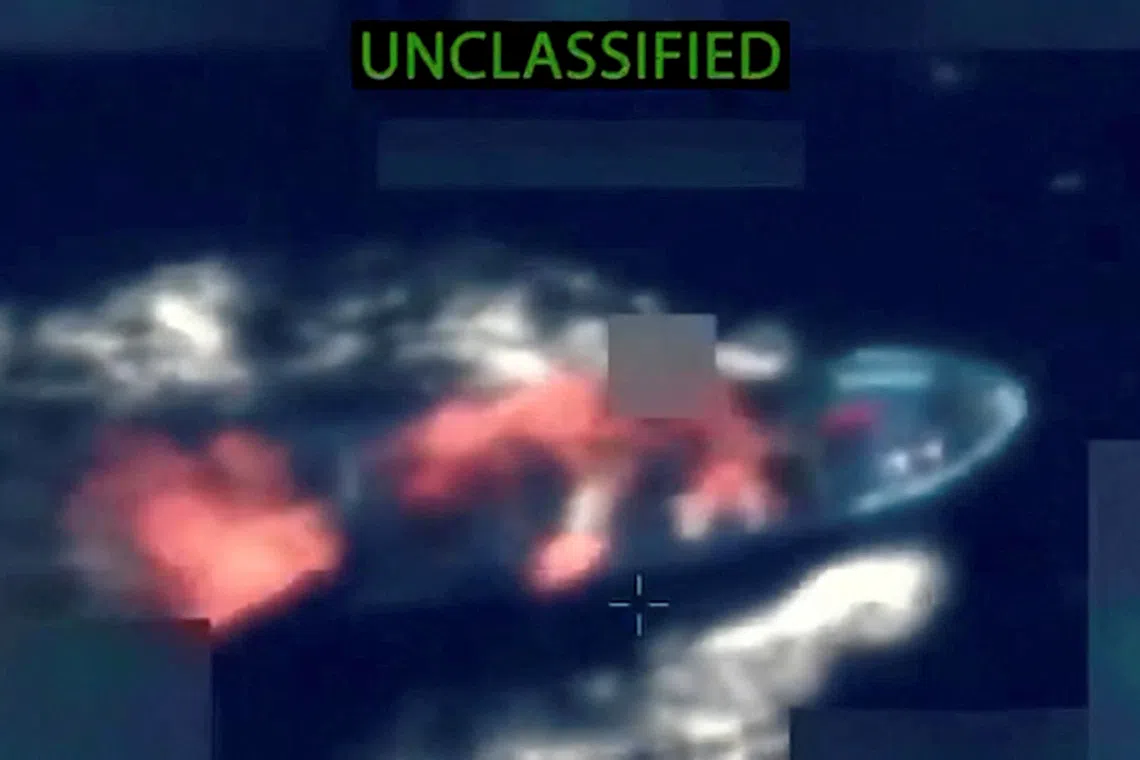Explainer: Are the deadly US strikes on alleged drug vessels legal?
Sign up now: Get ST's newsletters delivered to your inbox

The US military has conducted at least 13 deadly strikes against suspected drug vessels that have killed about 57 people.
PHOTO: REUTERS
WILMINGTON, Delaware - US strikes against suspected drug vessels in the eastern Pacific and Caribbean have killed dozens of people the Trump administration says are drug trafficking terrorists responsible for thousands of deaths in the US.
Human rights groups condemned the strikes as murder and a stark break with the tradition of protecting civilians from lethal force.
Below is a look at the legal authority for the strikes.
What is the US doing?
The US military has conducted at least 13 deadly strikes against suspected drug vessels
The strikes dramatically depart from the traditional approach of using the US Coast Guard to intercept maritime drug shipments and prosecute traffickers in court, which the Trump administration said was a failure.
The administration designated the trafficking groups as terrorist organisations, and has alleged that the Tren de Aragua gang is controlled by Venezuelan President Nicolas Maduro, which Caracas denies.
Human rights groups, including Amnesty International, have condemned the strikes as illegal, extrajudicial killings of civilians.
Families of presumed victims have denied their relatives were connected to drug trafficking.
What does the administration say?
Under the US Constitution, the power to declare war belongs to Congress. However, the administration said US President Donald Trump is using his constitutional role as the commander-in-chief of the armed forces and his authority to conduct foreign relations in carrying out the strikes.
Presidents representing both parties have in the past justified military force in limited actions abroad when it was in the national interest, was not restricted by Congress and did not rise to the level of war, said legal experts.
The Trump administration, in a notice to Congress that is required under the War Powers Act, said the military was engaged in “a non-international armed conflict”.
The military is justified in using force in self-defence against the cartel members, whom it called “unlawful combatants” and “non-state armed groups”, because the gangs were responsible for thousands of deaths in the US, the notice said.
Are the strikes legal?
Some legal experts said the strikes may violate international law as well as US laws against murder and prohibitions on assassination.
International law allows for the use of force in self-defence, which applies to an armed attack, or to an imminent armed attack.
The Trump administration told Congress that actions by the cartels constitute an armed attack on the US, citing the increasing flow of illegal drugs, paramilitary capabilities of the groups and significant loss of life in countries that are combating the groups.
Legal experts said that rationale falls short of what has been accepted by US administrations and under international law.
Declaring the cartels terrorist organisations has no bearing on whether military action is justified, experts said.
They also said cartels cashing in on demand for illegal drugs do not fit the traditional definition in international law of non-state armed groups, such as Al-Qaeda, which are organised to carry out sustained attacks for political and ideological reasons.
International law requires the US military to distinguish between legitimate targets and civilians. Critics of the strikes have said the administration has not provided such evidence, though the administration has said it has complied with the law of armed conflict.
Can anyone legally challenge the strikes?
Members of Congress from both parties have criticised the strikes, and lawmakers could put limits on the President’s use of military force
Democratic senators asked the Department of Justice on Oct 27 to provide legal memos that justified the strikes.
However, in recent decades, lawmakers have been generally ceding their war-making power to the president, and Republicans, who control Congress, are loath to cross Mr Trump.
The President holds enormous sway with Republican voters – 87 per cent of whom approve of his job performance.
Court challenges to carry out the strikes would face high hurdles, as US courts often defer to the president on matters of foreign relations and security.
The administration likely removed one possible legal hurdle when it returned two survivors of a strike to their home countries in Colombia and Ecuador.
Legal experts said releasing the alleged cartel members eliminated the possibility of a court battle over their detention and potentially a broader legal fight over the strikes’ legitimacy.
Victims’ families could try to bring a civil case for damages against the administration in the US, although it would require years of potentially costly litigation.
The attack could also be challenged in an international tribunal, an approach that has led some countries to acknowledge past abuses.
But experts said that such tribunals, which generally lack enforcement power, could not stop the Trump administration from carrying out the strikes. REUTERS


